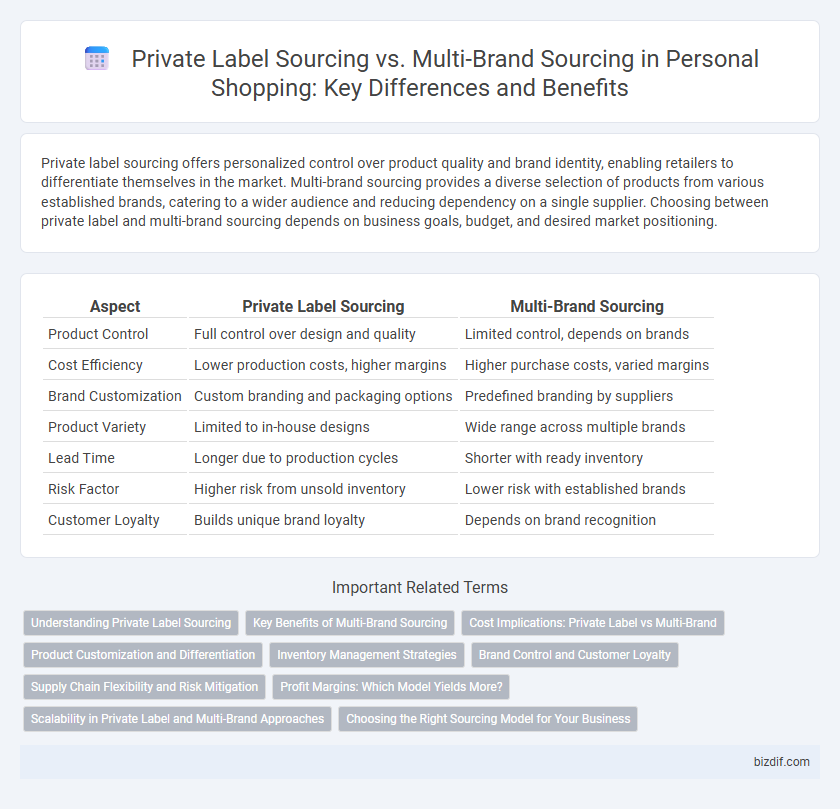Private label sourcing offers personalized control over product quality and brand identity, enabling retailers to differentiate themselves in the market. Multi-brand sourcing provides a diverse selection of products from various established brands, catering to a wider audience and reducing dependency on a single supplier. Choosing between private label and multi-brand sourcing depends on business goals, budget, and desired market positioning.
Table of Comparison
| Aspect | Private Label Sourcing | Multi-Brand Sourcing |
|---|---|---|
| Product Control | Full control over design and quality | Limited control, depends on brands |
| Cost Efficiency | Lower production costs, higher margins | Higher purchase costs, varied margins |
| Brand Customization | Custom branding and packaging options | Predefined branding by suppliers |
| Product Variety | Limited to in-house designs | Wide range across multiple brands |
| Lead Time | Longer due to production cycles | Shorter with ready inventory |
| Risk Factor | Higher risk from unsold inventory | Lower risk with established brands |
| Customer Loyalty | Builds unique brand loyalty | Depends on brand recognition |
Understanding Private Label Sourcing
Private label sourcing involves partnering directly with manufacturers to create exclusive products under a retailer's brand, allowing for greater control over quality, design, and pricing. This approach enhances brand identity and profitability by reducing reliance on external brands while catering specifically to target customer preferences. Understanding private label sourcing is crucial for personal shoppers aiming to deliver unique, customized shopping experiences that align with client needs and market trends.
Key Benefits of Multi-Brand Sourcing
Multi-brand sourcing offers access to a diverse product range, enabling personal shoppers to meet varied consumer preferences while reducing dependency on a single supplier. This strategy enhances price competitiveness through supplier negotiation and volume leverage, leading to cost savings for clients. It also improves supply chain resilience by mitigating risks associated with inventory shortages or quality inconsistencies from individual brands.
Cost Implications: Private Label vs Multi-Brand
Private label sourcing typically offers lower production costs and higher profit margins due to direct control over manufacturing and branding, reducing expenses related to intermediaries. Multi-brand sourcing often incurs higher costs because it involves purchasing from various suppliers, increasing overhead with diverse pricing structures and less volume leverage. Choosing private label can lead to more predictable budgeting and long-term cost savings, while multi-brand sourcing provides access to a wider range of products but with potential cost variability.
Product Customization and Differentiation
Private label sourcing offers unparalleled product customization by allowing full control over design, materials, and branding, resulting in unique, differentiated items tailored to specific customer preferences. Multi-brand sourcing limits customization options as products are pre-designed by various manufacturers, reducing the ability to create exclusive, distinctive offerings. Emphasizing private label sourcing enhances brand identity and competitive advantage through bespoke product development.
Inventory Management Strategies
Private label sourcing allows for streamlined inventory management by consolidating stock under a single brand, reducing complexity and improving demand forecasting accuracy. Multi-brand sourcing requires more sophisticated inventory systems to handle diverse product lines, ensuring optimal stock levels across various brands and minimizing stockouts. Efficient inventory management in multi-brand sourcing benefits from advanced analytics and real-time tracking to balance supply and demand dynamically.
Brand Control and Customer Loyalty
Private label sourcing offers greater brand control by allowing businesses to develop exclusive products tailored to their target audience, fostering stronger customer loyalty through unique and consistent brand experiences. Multi-brand sourcing provides variety and flexibility but can dilute brand identity, making it harder to build deep customer loyalty. Companies prioritizing long-term customer retention often prefer private label sourcing to maintain a cohesive brand narrative.
Supply Chain Flexibility and Risk Mitigation
Private label sourcing offers greater supply chain control and customization, reducing dependency on multiple suppliers and enhancing risk mitigation by consolidating production under one brand. Multi-brand sourcing increases supply chain flexibility by diversifying suppliers and product options, which spreads risk across different vendors and reduces vulnerability to disruptions. Balancing private label and multi-brand sourcing strategies optimizes supply chain resilience, ensuring consistent product availability and adaptability to market changes.
Profit Margins: Which Model Yields More?
Private label sourcing typically yields higher profit margins by allowing personal shoppers to control product quality, branding, and pricing strategies, reducing dependency on external brands. Multi-brand sourcing offers a broader product range but often results in thinner margins due to brand fees and competitive pricing pressures. Data shows private label products can increase gross margins by 20-30%, compared to the average 10-15% margins seen in multi-brand models.
Scalability in Private Label and Multi-Brand Approaches
Private label sourcing offers greater scalability by enabling businesses to control product development, branding, and pricing, which streamlines inventory management and enhances profit margins. Multi-brand sourcing provides flexibility in product variety and market responsiveness but often faces scalability challenges due to complex supplier relationships and inconsistent inventory levels. Efficient scaling in private label sourcing demands strong supplier partnerships and robust production capacity, while multi-brand strategies require agile logistics and diverse vendor coordination.
Choosing the Right Sourcing Model for Your Business
Choosing the right sourcing model for your personal shopping business depends on your brand strategy and target market preferences. Private label sourcing offers exclusive control over product design and branding, fostering unique customer experiences and higher profit margins. Multi-brand sourcing provides a diverse product range, appealing to varied consumer tastes and enabling rapid inventory refreshment without manufacturing commitments.
Private label sourcing vs Multi-brand sourcing Infographic

 bizdif.com
bizdif.com